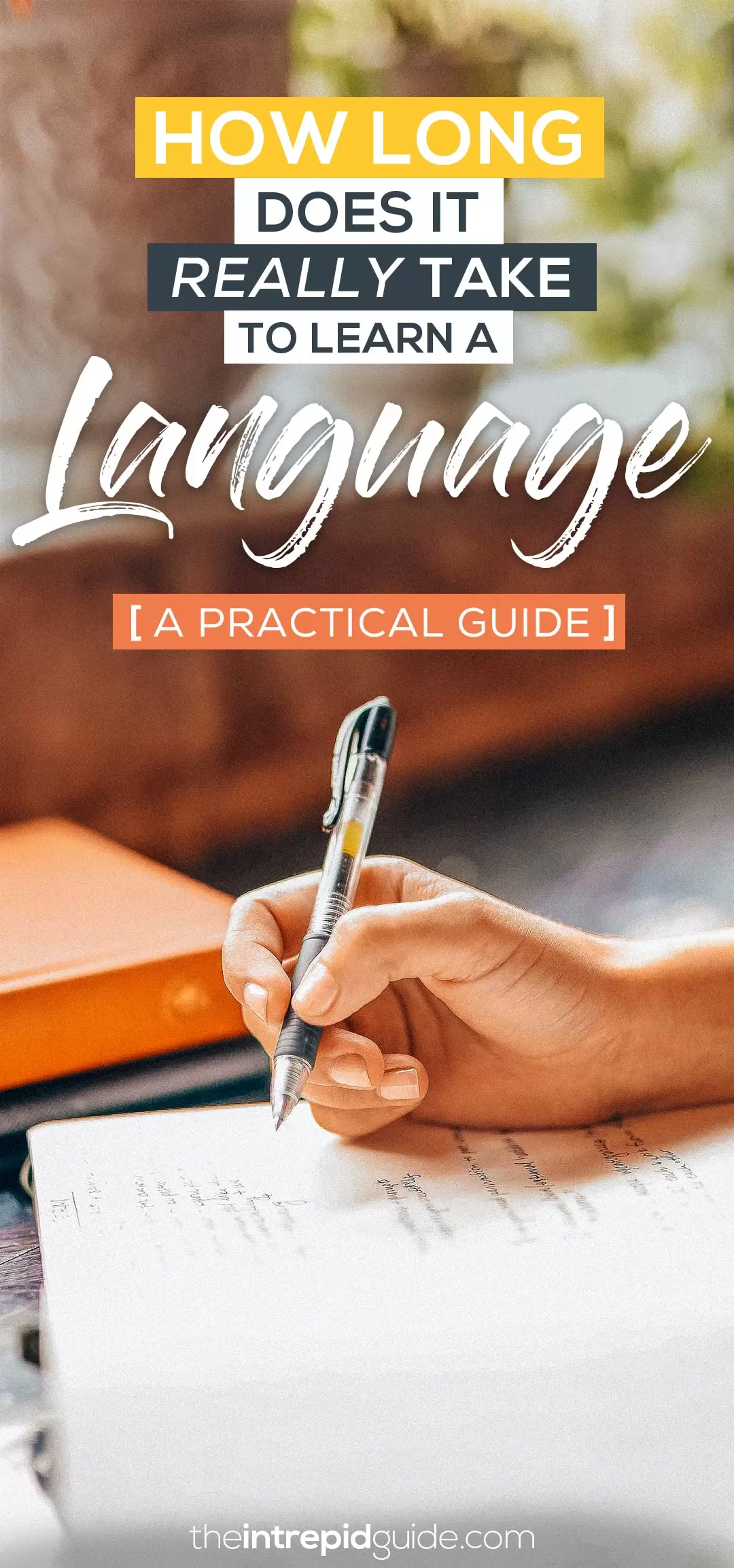Want to learn a second language? You’re probably asking yourself: How long does it take to learn a language? Years or months? Spoiler! The answer is: Both! This practical guide explains why!
We live in a fast-paced world that moves at an ever-increasing speed. From fast cars, fast deliveries, to fast Internet. We’re so used to getting things done fast that we almost demand it of everything in life. But can this same speed be applied to everything? Can you learn a language fast? If so, how long does it take to learn a language?
There are some incredible advantages and benefits to learning a foreign language: it boosts your career, enriches your travel experience, creates educational opportunities, and improves your social life. Learning a second language is so immensely beneficial that it even enhances brain health and cognitive abilities. It’s no wonder then, that we not only want to learn a foreign language to reap all these benefits – but we want to do it fast!
What does it mean to ‘speak a language’ and how long does it really take to be ‘fluent’? This guide explores what it means to be fluent, the different levels of language proficiency, how long it takes to achieve fluency in various languages, and best ways to learn a language. To help you get started, I’ll also be sharing 10 quick hacks that will speed up your progress and set your language skills on fire!
Let’s dive in!
Here’s what we’ll cover:
Table of Contents
- What does “fluency” really mean?
- What are the easiest and hardest languages to learn?
- According to the FSI, How long does it take to learn a foreign language?
- What are the different levels of proficiency?
- How many hours does it take to learn a language? Official stats by FSI vs. Reality
- Intensive vs. Extensive: How learning methods can make a difference
- What are some of the best ways to learn a new language?
- 10 quick hacks to learn a language faster
What does ‘fluency’ really mean?
 If you ask the question, ‘How long does it take to learn a language?’ the answer isn’t exactly black and white which makes it tricky to answer. One of the reasons is because it is hard to define what it means to learn or master a language.
If you ask the question, ‘How long does it take to learn a language?’ the answer isn’t exactly black and white which makes it tricky to answer. One of the reasons is because it is hard to define what it means to learn or master a language.
First of all, learning a foreign language is a process that has no end. It’s not like finishing a book that you can put back on a shelf. Even if you achieve fluency, you still need to constantly keep practising; otherwise, your skills will deteriorate.
Secondly, there is a question of what ‘fluency’ really is. Oxford Languages defines fluency as ‘the ability to speak or write a foreign language easily and accurately’, ‘the ability to express oneself easily and articulately’. However, even among linguists, there are no universally accepted definitions or measures of language fluency.
You’re considered fluent if you’re able to speak your target language in a fluid, or natural manner that is coherent, as opposed to slow, halting use, which shows a lack of confidence. Fluency is also often described as the ability to produce language on demand and be understood.
Thirdly, different types of fluency exist: reading, oral, writing fluency. It is quite possible for a language learner to develop some forms of fluency in these areas much better than others.
As you can see, ‘fluency’ is a rather vague notion, although it does help us to understand what mastering a language may mean. Later, we will take a look at different levels of proficiency and what they entail.
Related: How to Get Fluent: 9 Reasons You’re Not Fluent…YET! [& What To Do Instead]
What are the easiest and hardest languages to learn?
 How hard or easy it will be for you to learn a foreign language largely depends on your native language and also on other foreign languages you might already know. The rule of thumb is that it is usually much easier to learn ‘related’ languages, that is, languages that belong to the same group within a language family.
How hard or easy it will be for you to learn a foreign language largely depends on your native language and also on other foreign languages you might already know. The rule of thumb is that it is usually much easier to learn ‘related’ languages, that is, languages that belong to the same group within a language family.
English belongs to the Indo-European language family, Germanic group. The easiest languages for English speakers to learn include other Germanic languages, including, Danish, Dutch, Swedish, and Norwegian. They also include several Romance Indo-European languages, such as French, Spanish, Italian, and Portuguese.
One of the most commonly accepted ways of dividing languages into levels of difficulty for English speakers (including the time needed to master it) is provided by the Foreign Service Institute (FSI).
The FSI is where employees who work in the U.S. foreign affairs community receive official training by the United States federal government.
The timelines and level of difficulty outlined below are based on the FSI’s 70 years of experience in teaching foreign languages to U.S. diplomats. They show the average amount of time a typical student needs in order to reach ‘Minimum professional proficiency’ or ILR level 3 (see below) in the language. Of course, the actual time for each individual learner can vary based on a number of factors.
According to the FSI, How long does it take to learn a foreign language?
The FSI divides languages into the following groups of difficulty for speakers of English and how it takes them to learn a given language:
- Group 1: 24-30 weeks (600-750 class hours)
Danish, Dutch, Italian, Norwegian, Romanian, Spanish, French, Portuguese, Swedish. These are the languages most similar to English. - Group 2: approximately 36 weeks (900 class hours)
German, Indonesian, Malay, Swahili. - Group 3: approximately 44 weeks (1100 class hours)
Amharic, Bulgarian, Cambodian, Czech, Finnish, Greek, Hebrew, Hindi, Hungarian, Lao, Polish, Russian, Serbo-Croatian, Thai, Turkish, and Vietnamese. These are the so-called ‘hard languages’ meaning they are significantly different linguistically and/or culturally from English. This list is not exhaustive. - Group 4: 88 weeks (2200 class hours)
Arabic, Chinese, Japanese, and Korean.
These languages are sometimes referred to as ‘super-hard’ and are exceptionally difficult for native English speakers to master.
What are the different levels of proficiency?
 There are two scales used to describe the different levels of proficiency in a foreign language. The first is a scale used by the FSI which was originally developed by the Interagency Language Roundtable (ILR) and often referred to as the Interagency Language Roundtable scale.
There are two scales used to describe the different levels of proficiency in a foreign language. The first is a scale used by the FSI which was originally developed by the Interagency Language Roundtable (ILR) and often referred to as the Interagency Language Roundtable scale.
If you’ve ever studied a European language, then this second proficiency scale will be more familiar to you. It’s called the Common European Framework of Reference for Languages: Learning, Teaching, Assessment, but is usually abbreviated in English as CEFR or CEF or CEFRL.
Let’s take a look at what these different levels are and compare the two scales.
Elementary proficiency (ILR 1, CEFR A2)
At this level, you have exactly what its name suggests: an elementary, basic command of your target language. You know only the basic words, can answer questions about a limited number of every-day topics, be polite, and communicate your most basic needs.
Elementary proficiency means that you have a limited vocabulary and can write in simple sentences or sentence fragments with regular spelling and grammar mistakes. At this level, you won’t be able to discuss an unfamiliar topic spontaneously: you can only use the phrases you have learned.
Limited working proficiency (ILR 2, CEFR B2)
At ILR level 2, your capacity to communicate is a little higher: you can deal with a large number of routine social interactions, like introducing yourself, chatting about current events, work, family, and other personal topics. You can handle basic work requirements but may need help if any difficulties or complications arise.
In conversation, you usually get the gist of what you hear if the subject is non-technical and can reply simply but also improvise a little more than at the elementary proficiency level. Your command of grammar is also higher: you can handle basic constructions quite accurately but do not have thorough or confident control over the grammar.
Minimum professional proficiency (ILR 3, CEFR C1)
This level is generally used as a reference point to answer the question ‘How long does it take to learn a language?’ and to measure how many people in the world know a given language.
At this level, you understand and speak the language well enough to communicate at a high level in most types of conversations including practical, social, and professional topics. You can also discuss particular interests and special fields quite easily.
Your comprehension is quite complete for a normal rate of speech, your vocabulary is broad enough so that you rarely have to search for a word, your control of grammar is good, and major mistakes are rare… And yet, this is still called ‘minimum’ professional proficiency and there are two more levels to come!
Full professional proficiency (ILR 4, CEFR C2)
At ILR level 4, you have finally achieved fluency and accuracy on all levels necessary to fully satisfy professional needs. You can understand and participate in practically any personal or professional conversation, including unfamiliar topics and situations, and your precision of vocabulary is high.
You are still unlikely to be taken for a native speaker, but you make very few pronunciation and grammatical errors. At ILR 4, you can even handle informal interpreting in your target language.
Native or bilingual proficiency (ILR 5)
What is better than full professional proficiency? Reaching native or bilingual proficiency, of course! If you achieve this level of proficiency in your target language it means that your level is equivalent to that of an educated native speaker.
Congratulations! You’ve just nailed complete fluency! Your command of the language is so advanced that you’ve mastered the language in all of its features, including expressive vocabulary, colloquialisms, and cultural references.
Having said that, even at such a high level you need regular practice, otherwise, your skills will deteriorate. You wouldn’t want all that effort to go to waste now, would you?
How many hours does it take to learn a language? Official stats by FSI vs. Reality
 As you can see above, the FSI states that it takes 24-30 weeks or 600-750 class hours to reach ‘Minimum professional proficiency’ (ILR 3, CEFR C1) if you are learning languages from Group 1 – the easiest languages for a native English speaker to master.
As you can see above, the FSI states that it takes 24-30 weeks or 600-750 class hours to reach ‘Minimum professional proficiency’ (ILR 3, CEFR C1) if you are learning languages from Group 1 – the easiest languages for a native English speaker to master.
Mastering languages from Group 4, or the ‘super-hard’ languages like Japanese or Arabic, will take you 88 weeks or 2200 class hours.
This doesn’t seem too bad. But how realistic are these numbers?
The FSI themselves state that these are ‘average’ numbers and individual results can vary depending on a number of factors, such as the learner’s natural ability, prior linguistic experience, time spent in the classroom, and others.
What’s more, these are official stats based on years of training diplomats and foreign affairs employees, who receive intensive language courses specifically crafted for them.
But, we can’t all afford to study like a diplomat! The rest of us work full time, have kids, run errands chores, and generally have extremely busy schedules and lifestyles.
We don’t have the luxury of learning a foreign language in the same way a language or foreign affairs student can. Stuff happens and we take breaks. Life gets in the way and sometimes we fall off the language-learning bandwagon and return days, weeks or even months later.
Now, consider a student at a linguistic university who has language lessons every day, which includes both theory and practice. They study the language up to several hours a day! That’s almost like a full-time job! (A pretty awesome one too!) If they start with zero knowledge in the language, in 3-4 years time, they’ll reach ILR 3 or 4 (CEFR С1 or C2).
Compare this to if you study part-time by yourself, using textbooks, watching YouTube videos, and using language learning apps, you may only reach about ILR 2 (CEFR B1 or B2) in the same amount of time.
So, are the official statistics completely useless if you are a non-diplomat? Of course not! They still give you a more or less clear understanding of what languages will be easier or harder for you to learn. They can also provide you with some idea of how long it may take you to reach your desired level of proficiency.
With a well-established routine, dedication, and passion to keep going, you can master any foreign language. Just keep in mind that it may take you a little longer than a foreign affairs employee or a language student studying full-time.
Not all hope is lost. Here are some learning methods to help you learn a language efficiently and effectively .
Intensive vs. Extensive: How learning methods can make a difference
 In language learning, you often hear about extensive and intensive reading. Extensive reading is reading a lot of different texts for pleasure which don’t present too much difficulty. The aim is to gain a general understanding of the topic. Intensive reading means diving deeper into the texts and language itself. You read the texts in detail to fully understand the text and usually with specific learning goals in mind like acquiring new vocabulary.
In language learning, you often hear about extensive and intensive reading. Extensive reading is reading a lot of different texts for pleasure which don’t present too much difficulty. The aim is to gain a general understanding of the topic. Intensive reading means diving deeper into the texts and language itself. You read the texts in detail to fully understand the text and usually with specific learning goals in mind like acquiring new vocabulary.
Both types of reading are important: if you don’t read extensively, you do not practice general reading skills. On the other hand, if you don’t read intensively, then you don’t learn new language material and don’t develop as fast.
This same principle can be applied to learning in general. You can study hard (intensively) and you can also have general fun practice (extensively) like reading your favorite books or watching movies. To learn a language effectively and to practice and develop all related skills, it is essential to combine both of these learning methods.
What are some of the best ways to learn a new language?
Nowadays there are many different ways of learning a language, even for non-linguists and non-diplomats. Here are some of the best ways to learn a language. You can use one method or combine them together for maximum effect.
Take online lessons
You don’t need to leave the comfort of your home to learn a language with an experienced teacher. Online platforms like italki allow you to find experienced language teachers in over 100 languages from all over the world. To supplement my own language learning I personally use italki multiple times every week. This is where I get 1-to-1 support and speaking practice with a qualified teacher or community tutor. You can read my full italki review here and book your first italki lesson here.
Join a language school
Even in the day of modern technology, studying offline is still a great way to learn a language. It helps you stay accountable and make new friends. It even allows for a more personal connection with your teacher and the ability to participate in fun language learning activities with your classmates.
Use language learning apps
More and more language apps appear every day, and there are many great ones that are either free or super affordable. Some apps like Duolingo offer general comprehensive courses, some like Memrise, uTalk (Get 30% OFF uTalk here) and Mondly (Get 95% OFF Mondly here) are more focused on one aspect of the language, such as, for instance, vocabulary. There are also apps like Tandem and HelloTalk that allow you to find speaking partners to practice your target language.
Immerse yourself in the language
When you are surrounded by a foreign language, there is no way out – you learn it just by living in the language environment. You can take an intensive language course at home, go on a language holiday abroad, or for a more radical approach – do what I did and relocate to the country where they speak your target language. Ciao, Roma!
You can also create a form of artificial immersion at home. Try switching all your devices to your target language, consume more foreign media, and communicate in the language as much as possible.
Self-study
While working with a teacher is great, studying by yourself allows for the most flexibility: you can study anywhere, at any time, in the way that suits you the most. There are a ton of resources that can help you from self-instruction books like the Teach Yourself series, language learning podcasts and YouTube channels. You can also learn the language passively by watching movies, reading the news, and listening to music, or radio broadcasts.
10 quick hacks to learn a language faster, speed up your progress and set your skills on fire!
1. Set S.M.A.R.T Goals
Setting your own language learning goals is essential. If you don’t know where you are going, how can you get there effectively? Setting S.M.A.R.T. goals are beneficial because they help you clearly paint a picture of what you want to accomplish while providing a detailed roadmap for how to make your language-learning goals come true. S.M.A.R.T goals stands for Specific, Measurable, Achievable, Realistic, and Timely. Learn how to integrate language learning into your daily routine with S.M.A.R.T goals.
2. Short lessons every day
A little bit of practice everyday is key! Why? Because it helps you to be disciplined and retain what you learn more effectively. If you have just one hour for practice a week, don’t spend it all on one hit – divide it into smaller 5, 10, or 15-minute chunks each day.
3. Boredom is the enemy
If you don’t like a teacher, textbook, method, app, or any other resource, change it up! Look for something new, different, more exciting or challenging. Learning a language should be fun – and it is! If it’s not, it’s a clear sign you need to mix things up.
4. Understand what kind of language learner you are
We all perceive information in different ways. Some of us are visual learners, others are aural, verbal or kinesthetic learners. By understanding the way you learn best, you can play to your strengths and make language learning even more effective. Do you know what type of language learning you are? Find out what kind of language learner you are so you can set yourself up for success. This is especially important to know if you have a busy life and want to manage your learning time effectively. Check out my 3-step method for learning languages like crazy, even if you have a crazy life.
5. Track your progress
Record yourself talking, keep some of your essays, notebooks, and test results so you can look back and see how far you’ve come. This is a great way to remind yourself that you are still learning even if you feel like you’re not. Think of it like taking before and after photos when you do a long-term fitness programme. The scale doesn’t tell the whole story. Your body is changing and the photos are the best way to see that. Looking back over old language notes and comparing them with recent ones is just like taking a snapshot of your brain and your progress in learning your target language.
6. Don’t be afraid to make mistakes
This is easier said than done, but overcoming your fear of mistakes is crucial. No matter what language you learn and in what context, you learn by making mistakes. You won’t improve by keeping your mouth shut!
7. Mix things up!
They say ‘variety is the spice of life’, but I say ‘variety is the spice of language learning! When it comes to learning languages, using a variety of resources and materials is crucial to not only keep things interesting and avoid boredom, but it ensures you’re exposing yourself to as much of your target language as possible.
The more variety and exposure you have, the more effective your learning becomes. Take, for instance, listening. If you only listen to the same podcast with the same narrator, you can get used to that person’s accent pretty fast and don’t develop an ear for other accents and new ways of speaking and expressing oneself. You need to listen to a mixture of voices and accents in order to improve your general listening skills.
8. Make it relevant
You may enjoy reading classic literature (which is great!) but it won’t teach you modern vocabulary and communication styles. If you need to learn a foreign language for business purposes, studying with cartoons may not be the best strategy. Make what you study relevant – to the modern world, as well as to your own goals.
9. Put it into practice
While learning vocabulary and doing grammar exercises is important, it’s not enough to reach fluency. You have to put into practice what you learn as soon as you learn it. The sooner and more often you do this, the more likely you are to remember it in the long-term.
10. Fall in love with your target language
We learn more effectively when we are motivated, and one of the ways to do this is to love the subject we are studying. Even if you are learning a foreign language ‘for work’ or some other purely pragmatic reason, try to find other aspects that you enjoy about it. Does it sound beautifully melodic? Will it allow you to read your favourite authors in the original language? Or are you excited about using it when you travel? When the language learning road gets bumpy, if you think back to your ‘why’, you’re more likely to stay on track.
Next steps: You’ve got this!

The joy of knowing a foreign language is inexpressible” – Munia-Khan
Many beautiful and inspirational words have been said about learning languages. Speaking another language opens you up to meet new people, become more culturally aware, see the world from a new perspective, and become a little wiser along the way.
No matter which language you want to learn, either from the ‘easy; or a ‘super-hard’ group, there’s just one thing you need to do. Start! It doesn’t take too much effort. Start by taking a trial lesson with a tutor online or join a language school. Download a language learning app and learn your first 10 words. Find a community of learners online and make some friends.
It doesn’t really matter what you start with – you can always course-correct along the way. With motivation, perseverance, and regular practice you can achieve fluency in any language! Remember, you’ve got this!
Want to know more about learning languages? Start here!
- How to Learn Languages Like Crazy, Even If You Have a Crazy Life [3-Step Method]
- 22 Top Language Learning Resources You Should Use
- How to Get Fluent: 9 Reasons You’re Not Fluent…YET! [& What To Do Instead]
- 18 Unexpected Advantages & Health Benefits of Learning A Foreign Language
- 10 Proven Memory Hacks: How to Remember New Vocabulary Faster
- Memrise vs Duolingo: Which Language App is Best For You?
- Mondly Review: 10 Ways Mondly Drastically Improved My Language Learning
- 203 Most Beautiful Untranslatable Words [The Ultimate List: A-Z]
- 6 Language Learning Tips: How to Learn a Language from Home
- What Type of Language Learner Are You? Your 4-Step Personalised Learning Plan
- 203 Most Beautiful Untranslatable Words [The Ultimate List: A-Z]
- 44 Best Movies on Disney Plus for Learning Languages
- 13 Ways to Seamlessly Integrate Language Learning into Your Daily Life
- 10 Pro Tips: How to Learn a Language with a Full-Time Job
- 7 Reasons Why You Should Go on a Language Holiday
- Essential Travel Phrases: How to be Travel Fluent in 10 Simple Steps
- 23 Cool Gift for Language Learners They Will Actually Use and Love
- How to Learn Your First Foreign Language in 8 Simple Steps: A Beginner’s Guide
- 11 Life-Changing Reasons Why You Should Learn a Language
- 42 beautiful Inspirational Quotes for Language Learners
- Language learning tips: 11 Polyglots Reveal The Secrets of Their Success
- Top 10 Best Ways to Learn a Language Better and Faster
- How Many Languages are there in the World?
- 78 FREE Dictionaries to Learn a Language Fast [Free eBook Download]
- 22 KEY Travel Phrases That Will Transform Your Travels [Free Guide]
Like it? Pin it for later!

Over to you!
Are you learning a language? Do you agree with these timeframes?
Let me know using the comments section below or join me on social media to start a conversation.
Thanks for reading and I hope you enjoyed this post.
Like what you see? Subscribe using the form below to have all of my posts delivered directly to your email.

